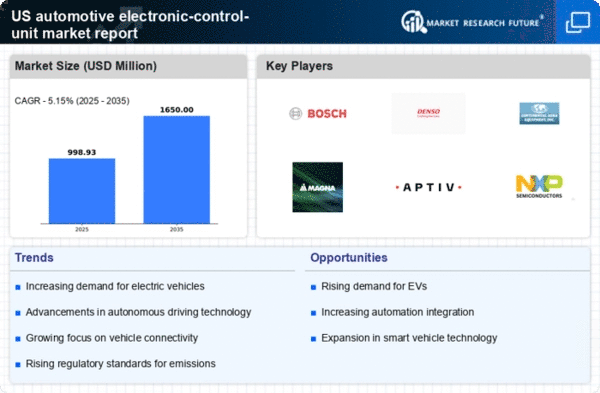Growth of Connected Vehicle Technologies
The growth of connected vehicle technologies is a significant driver for the automotive electronic-control-unit market. As vehicles become increasingly integrated with communication technologies, the demand for electronic control units that support connectivity features is on the rise. These features include vehicle-to-vehicle (V2V) communication, real-time traffic updates, and remote diagnostics. In the US, the connected vehicle market is anticipated to grow at a CAGR of around 15% over the next five years, indicating a strong shift towards smarter transportation solutions. This trend not only enhances the driving experience but also contributes to improved traffic management and safety. Consequently, the automotive electronic-control-unit market is likely to benefit from this technological evolution, as manufacturers strive to meet the growing expectations for connectivity and data exchange.
Increasing Adoption of Electric Vehicles
the automotive electronic-control-unit market is significantly driven by the increasing adoption of electric vehicles (EVs) in the US. As consumers become more environmentally conscious, the demand for EVs is rising, necessitating the development of specialized electronic control units tailored for electric drivetrains. These units are essential for managing battery systems, regenerative braking, and energy efficiency. According to recent estimates, the EV market share in the US is projected to reach 25% by 2030, which will likely drive substantial growth in the automotive electronic-control-unit market. This shift towards electrification not only enhances the performance of vehicles but also aligns with broader sustainability goals, thereby reinforcing the importance of electronic control technologies in the automotive sector.
Rising Demand for Vehicle Safety Features
The automotive electronic-control-unit market experiences a notable surge in demand driven by the increasing consumer preference for enhanced vehicle safety features. As safety regulations become more stringent, manufacturers are compelled to integrate advanced electronic control units that facilitate features such as automatic braking, lane-keeping assistance, and collision avoidance systems. In the US, the market for safety-related electronic components is projected to grow at a CAGR of approximately 8% over the next five years. This trend indicates a robust investment in electronic control technologies, as automakers strive to meet regulatory requirements and consumer expectations. Consequently, the automotive electronic-control-unit market is likely to expand significantly, reflecting the industry's commitment to improving vehicle safety and reducing accident rates.
Regulatory Compliance and Environmental Standards
Regulatory compliance and environmental standards are critical drivers impacting the automotive electronic-control-unit market. As governments implement stricter emissions regulations, manufacturers are increasingly required to adopt advanced electronic control technologies that optimize fuel efficiency and reduce emissions. In the US, the Environmental Protection Agency (EPA) has set ambitious targets for reducing greenhouse gas emissions from vehicles, prompting automakers to invest in innovative electronic control solutions. This regulatory landscape is expected to propel the automotive electronic-control-unit market, as companies seek to develop systems that not only comply with regulations but also enhance vehicle performance. The ongoing evolution of environmental standards will likely continue to shape the market dynamics, fostering a competitive environment focused on sustainability.
Technological Advancements in Automotive Electronics
Technological advancements play a pivotal role in shaping the automotive electronic-control-unit market. Innovations in microcontrollers, sensors, and software algorithms are enabling the development of more sophisticated electronic control units. These advancements facilitate the integration of features such as adaptive cruise control, electronic stability control, and advanced infotainment systems. In the US, the automotive electronics sector is expected to reach a valuation of over $100 billion by 2026, with a substantial portion attributed to electronic control units. This growth is indicative of the industry's focus on enhancing vehicle performance and user experience through cutting-edge technology. As manufacturers continue to invest in research and development, the automotive electronic-control-unit market is poised for further evolution, potentially leading to the introduction of groundbreaking functionalities.















